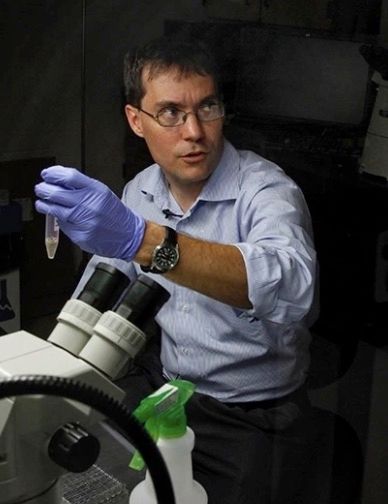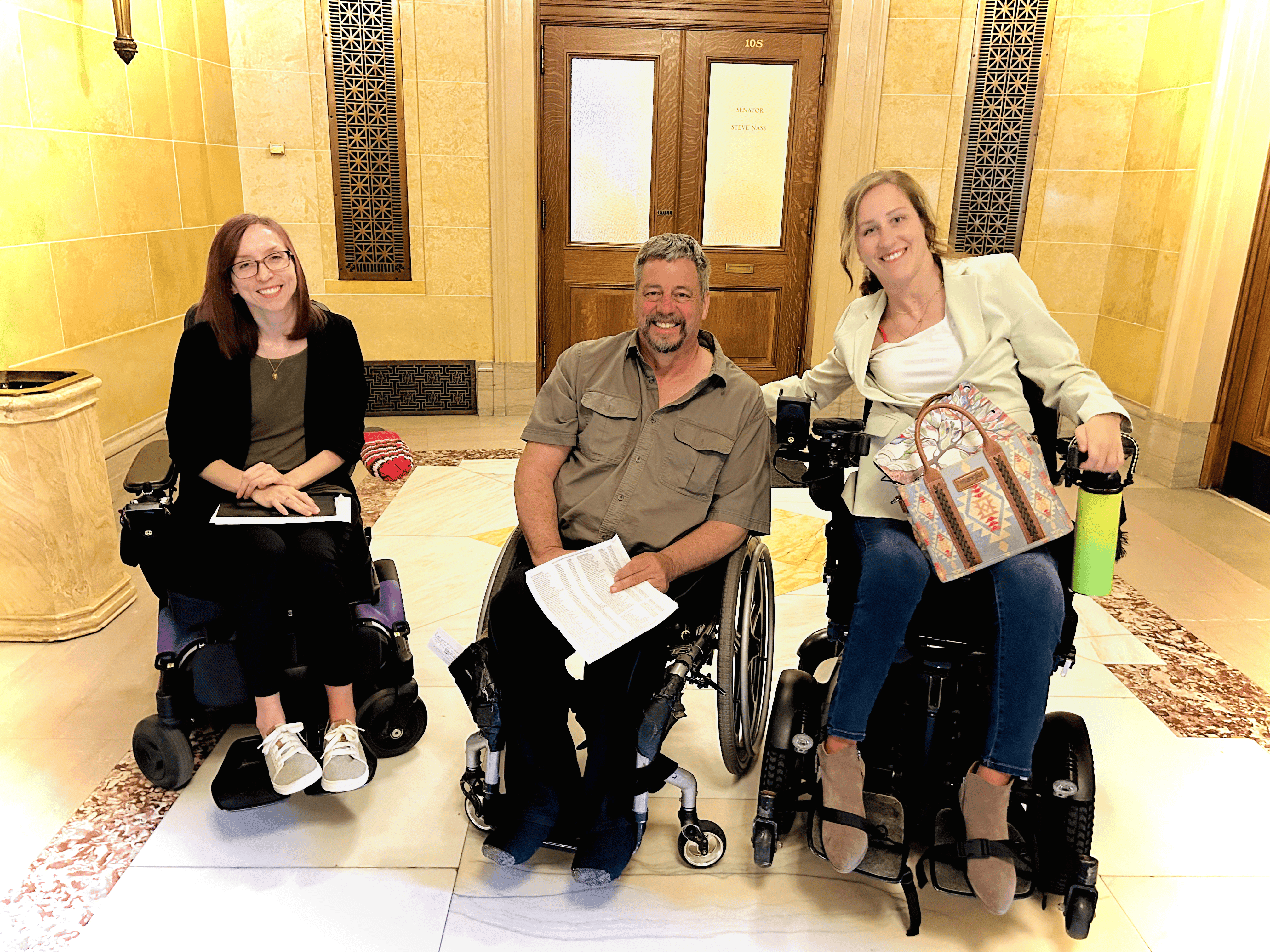
The biomedical research world, including spinal cord injury studies, has pretty much ground to a halt. COVID-19 has closed labs and sent scientists, students and clinical trial participants home to ride out the pandemic. Many (especially students) cannot get in the lab to finish experiments; new projects are on hold. No one can go to conferences or have in-person staff meetings.
The clamp-down has hit the clinical side hard too. Clinical trials are on hold. Rehab hospitals have canceled in-patient medical appointments, and have tightly restricted visiting privileges for the hospital. Peer support programs are not going on, at least not in person. We are all remote, and becoming experts with Zoom.
These are indeed challenging times. Here at U2FP, we are hoping the lab lights are turned on again soon, and we are preparing for that day. We continue to form alliances with cure advocates, the research community and state legislators, always focusing on treatments for chronic spinal cord injury. Especially during this big COVID pause, we’re committed to keeping the community informed.
[Watch for our upcoming podcast interview with Dr. Sasha Rabchevsky (University of Lexington) and Dr. Michael Lane (Drexel College of Medicine) talking about the effects of the shutdown on their labs.]
Here’s a look at how the coronavirus has impacted SCI science and clinical medicine:
Jerry Silver, Case Western Reserve, Cleveland. Dr. Silver is well-known to the U2FP community, having presented at Working 2 Walk several times. His work to reanimate paralysis using a peptide to unblock nerve growth has spawned a biotech startup, NervGen.
While my lab is open and functioning, an important collaboration involving chronic SCI with my former postdoc who is at University College in London had to be terminated and all animals had to be killed. Not good.
Murray Blackmore (pictured above) studies axon regeneration at Marquette University in Milwaukee.
This is a major and expensive setback, because it disrupts ongoing experiments and prevents us from initiating anything new. Even if we went back to work tomorrow – and we won’t – we would be feeling the ripple effects for many months. We can remotely access computers and analyze data, and I’m trying to mobilize people to start writing up the results in hand. We have virtual lab meetings and share screens to look at existing data, but despite our best efforts it is much less effective than I would like. For now, animals are the big problem. These are large, long-term experiments with groups of animals that have received injuries and need daily care. We are struggling with a skeleton crew and restricted access just to get the existing experiments to the finish line. Obviously nothing new is starting, which means in the coming months nothing will come out of the pipeline. A complete shutdown would be even worse because it would create all kinds of equipment risk. If a freezer goes down and nobody is there to notice, we are talking tens of thousands of dollars of reagents destroyed. We aren’t at that point yet, we still have limited access.
Keith Tansey is a doctor and a scientist and member of the U2FP Scientific Advisory Board (SAB) He works at the Center for Neuroscience and Neurological Recovery, Methodist Rehabilitation Center; is professor of Neurosurgery and Neurobiology, University of Mississippi Medical Center; and also takes care of patients at the Jackson VA Medical Center.
We are working from home and in our different offices but it’s all number crunching and writing, no experimentation (so no need for people in the lab). For students and junior faculty, those most concerned with production, the pandemic may be interrupting or delaying experimentation which may negatively impact progress on a degree, gaining preliminary data needed for a grant deadline or possibly meeting criteria for promotion.
David Darrow is a University of Minnesota neurosurgeon who initiated an epidural spinal cord stimulation trial called ESTAND.
ESTAND is on hold but the lab is functioning -- all remotely. We switched gears to catching up on publications, reviewing regulatory, planning, and grants. Everyone is in good spirits and healthy. Participants are all doing well. The primary effect is that we are just on hold with visits. We cannot program remotely (would violate medical licensing restrictions), so we can only modify what participants are doing to collect remote data.
Ceren Yarar-Fisher is a scientist at the University of Alabama-Birmingham. She studies exercise and nutrition and has been conducting a clinical trial to assess the effect of the Keto Diet (high protein, high fat, very low carbohydrates) in acute spinal cord injury.
Due to the corona virus we had to stop our trial. The university only allows essential research activity (trials investigating corona vaccine). We had been actively enrolling until the shut down.
Dr. Kim Anderson-Erisman is a Professor of Physical Medicine and Rehabilitation at the MetroHealth Medical Center and Case Western Reserve University (CWRU) School of Medicine, Cleveland.
People going through inpatient rehab right now are even more vulnerable than people with chronic SCI because most have additional acute trauma, they are in the hospital where infection can spread, their interactions with therapists is limited, and if we start experiencing overflow needs in the hospital they will be discharged early.
Dimitry Sayenko studies spinal neuromodulation at Houston Methodist Research Institute
We have been considered as “essential stuff” in our institute, so, technically, we are allowed to work from the office. At the same time, student-volunteers and visiting scholars are not allowed to be at work. Experiments in human subjects cannot be performed due to safety concerns.
Moses Chao is a Professor of Cell Biology, Physiology, Neuroscience, and Psychiatry at the New York University School of Medicine; he is a member of the U2FP SAB.
My laboratory has been closed. Personnel are allowed on a limited basis. Only one person is allowed in each laboratory at any one time. There is no continuous research allowed. There is limited access to the animal facility. Students and postdocs are supported and technicians can work at home, if possible, and will be hopefully supported. Experimentation to finish a manuscript or a research project is not allowed.
Alexander “Sasha” Rabchevsky is professor of physiology in the University of Kentucky College of Medicine, a member of the Spinal Cord and Brain Injury Research Center, and a U2FP Board Member.
The university is shutdown except for essential personnel, which for now includes staff and faculty (no students) for critical animal care or to finish key terminal experiments ... no new procedures can be started.
All students have been forbidden from going in at all. Obviously this is wigging grad students regarding required critical lab work. All outpatient services are canceled, so any human studies involving face-to-face meetings are suspended.
Tommy Sutor studies Activity-Based Exercise at the University of Florida
Our labs at UF and at Brooks Rehabilitation in Jacksonville are shut down. We are all continuing to work from home - there is lots of data to analyze and grants and papers to write. We are not permitted to enroll any participants in any of our studies, since our studies are not considered essential to saving lives.
John Houle is a professor in the Department of Neurobiology & Anatomy at Drexel University College of Medicine, and director of the Spinal Cord Research CenterHe is a member of the U2FP SAB.
Drexel University closed all research labs except for those with existing animal studies that could be completed within a reasonable amount of time. Only one person per one of these exempted labs is allowed in the building at a time and it all must be coordinated with the department chair and building security.
Before disbanding we outlined work assignments for each student/research fellow, not knowing how long this shutdown might last. Most of the work entails data analysis and preparation of figures for manuscripts. Some junior students are preparing for their Qualifying Exams by writing NIH format research proposals. Another student is working with me on a book chapter. Everyone is contributing where possible but it is difficult to be separated physically.
Regarding funding: This is an important question and PIs [principal investigators] are concerned. We have not gotten very far in our departmental discussions about the possible institutional response because no one knows the length of time or severity of economic impact this pandemic will have. There will have to be cuts everywhere I would imagine. Obviously we all are anxious personally and professionally.

















